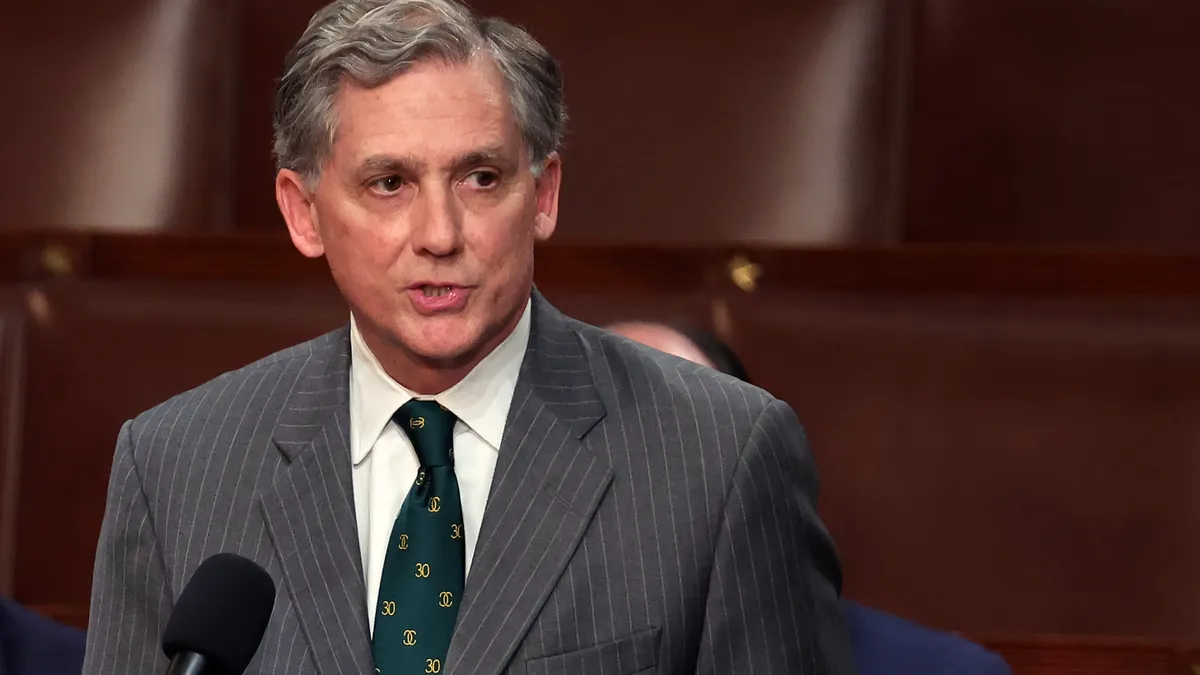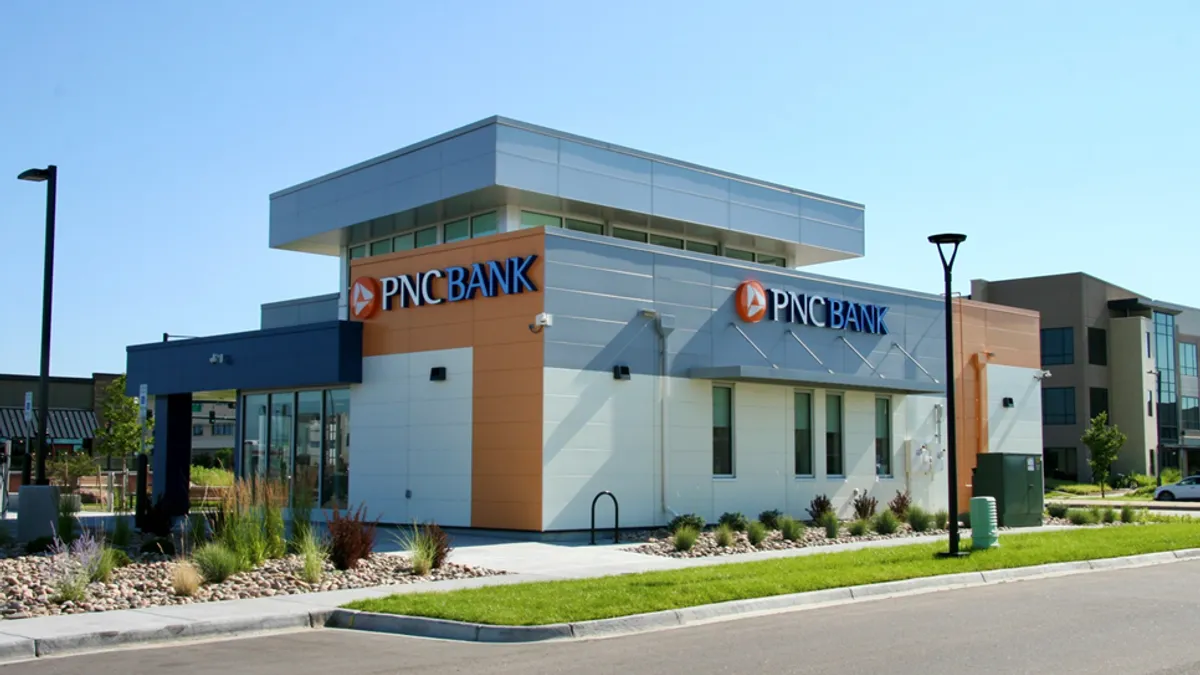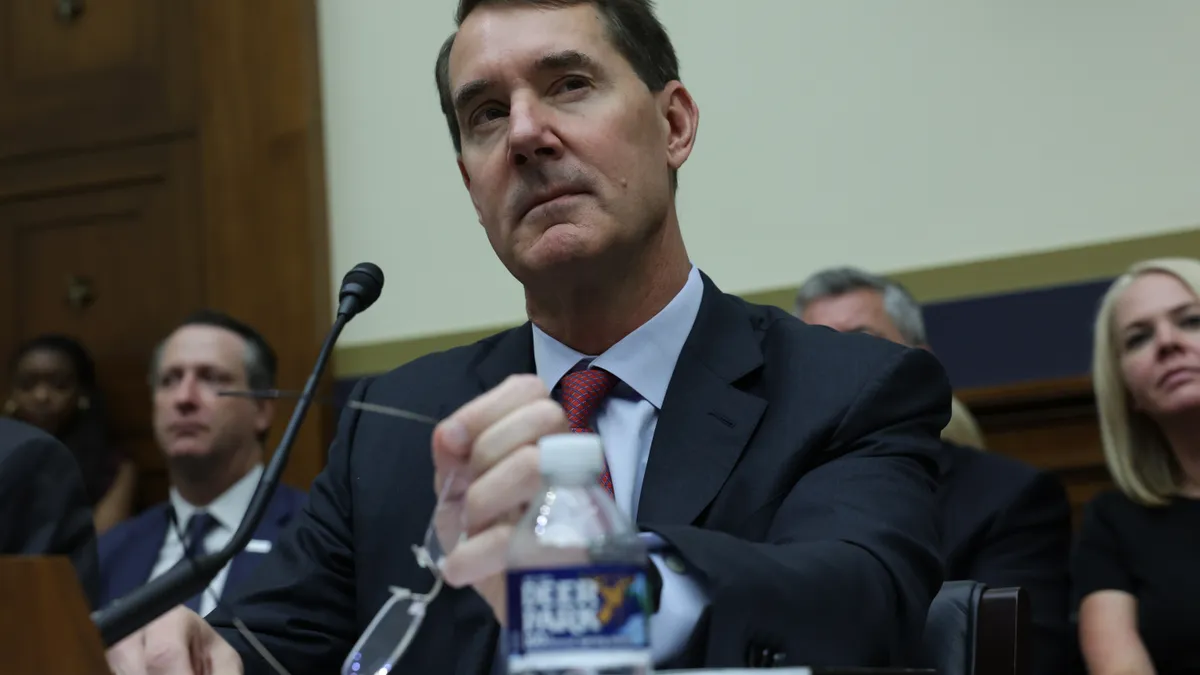Rep. French Hill, R-AR, put forth plans Thursday designed to support community banking, as he angles for the top Republican spot on the House Financial Services Committee.
Hill is requesting comments on his set of principles by Dec. 31, in the name of guiding his legislative framework in the next congressional session.
With the upcoming retirement of the committee’s current chair, Rep. Patrick McHenry, R-NC, one of the top posts for Washington’s financial policymakers will be vacant. Hill serves as the panel's vice chair and leads a subcommittee overseeing digital assets and financial technology. Along with Rep. Andy Barr, R-KY, Hill is considered among the top candidates to lead the committee beginning next year.
Prior to joining Congress, Hill was CEO of Delta Trust & Banking Corp.
“The House Financial Services Committee has not had a former banker hold the gavel in over a century,” Hill said in a statement. “As a former Founder, Chair and CEO of a community bank, I have a plan to make community banking great again in this country.”
The Republican’s banking principles, coined “Make Community Banking Great Again,” push for regulatory fairness and transparency, seek to promote healthy banking space for financial institutions of all sizes, and improve funding and capital, Hill said.
“Most have to be tackled by legislation, but instead of bogging down a thought process to find consensus by actually drafting detailed pages and pages of legislation, I thought it was more effective to lay them out as principles,” Hill told American Banker. “That way for the things that require legislation, you can find consensus and cosponsors and interested parties to lead the charge.”
Hill’s principles include tailoring bank mergers and acquisitions so regulators cannot indefinitely delay mergers; adding flexibility in approving bank deals in counties without a physical bank or credit union branch; and revisiting the methodology to evaluate bank deals.
He recommends regulators jointly examine and report to Congress on ways to improve the profitability of U.S. banks and address the lack of de novo bank charters, especially in underserved regions.
Hill noted that nonbank capital sources should be allowed to partner with qualified banks or bank executive management teams to be pre-approved for a "shelf charter" with the Federal Deposit Insurance Corp. That would enable them to be candidates for mergers and acquisitions, such as purchasing a failed bank.
Hill’s principles also touched upon the FDIC’s brokered deposits rule. The FDIC should maintain its 2020 rule and withdraw this year’s proposal – which would expand the definition of deposit brokers while reinstating restrictions on less-capitalized banks’ access to volatile or “hot money” deposits – to allow institutions to access diverse funding and give consumers more choices, he said.
Hill also proposed that the FDIC waive the least cost resolution requirement when a bank fails, if the accepted transaction would increase competition and economic growth under certain circumstances.
It should be more challenging for the FDIC to waive the national deposit cap rule, which prohibits a bank from acquiring another if the combined entity holds more than 10% of deposits nationwide, Hill said. The FDIC should be required to provide Congress with a detailed written justification for each waiver and demonstrate that other outcomes were considered and encouraged, he said.
Democrats, like incoming Senate Banking Committee ranking member Sen. Elizabeth Warren of Massachusetts, have criticized how banking agencies have handled the sale of failed banks' assets to larger institutions.
Hill’s principles also said federal regulators should not be able to order financial institutions to terminate a customer’s bank account if it’s tied to certain industries like firearms or digital assets without a valid reason.
In those cases, “Congress should fully investigate the conduct of agency personnel to find if their actions and policies were consistent with applicable laws, regulations, and policy,” the principles noted.
Climate stress testing should be optional for financial institutions and should not affect capital requirements; instead, climate testing should be considered in existing risk assessments, Hill proposed. Further, regulatory tailoring for community banks should be re-established, requiring regulators to tailor actions based on the institution's characteristics and review compliance with tailoring requirements, he said.
To help community banks grow using certain debt financing, the consolidated asset threshold under the Small Bank Holding Company Policy Statement should be raised, Hill proposed.
Additionally, Hill said regulators should be open to innovation related to banks’ third-party relationships.
Former Consumer Financial Protection Bureau Director Kathy Kraninger praised Hill’s principles.
“Our nation needs banks of all sizes operating in a dynamic, competitive, and fair marketplace to ensure consumers, small businesses, and communities thrive,” Kraninger said.






















